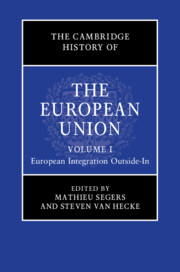Book contents
- The Cambridge History of the European Union
- The Cambridge History of the European Union
- The Cambridge History of the European Union
- Copyright page
- Contents
- Figures
- Contributors to Volume I
- Acknowledgements
- Abbreviations
- Reflections on the History and Historiography of European Integration
- Part I Critical Junctures
- Part II Multilateralism and Geopolitics
- Market, Society and Security
- 7 A Pillar of the Golden Age? European Integration and the Trente Glorieuses
- 8 The End of Bretton Woods: Origins and European Consequences
- 9 The Vicissitudes of Market Europe
- 10 European Integration and the Challenges of Free Movement
- 11 The EU as a Global Trade Power
- 12 The Enduring Relationship between NATO and European Integration
- Global Challenges: International Politics, the Planet and the Universe
- Part III Perspectives and Ideas
- Index
- References
11 - The EU as a Global Trade Power
from Market, Society and Security
Published online by Cambridge University Press: 21 October 2023
- The Cambridge History of the European Union
- The Cambridge History of the European Union
- The Cambridge History of the European Union
- Copyright page
- Contents
- Figures
- Contributors to Volume I
- Acknowledgements
- Abbreviations
- Reflections on the History and Historiography of European Integration
- Part I Critical Junctures
- Part II Multilateralism and Geopolitics
- Market, Society and Security
- 7 A Pillar of the Golden Age? European Integration and the Trente Glorieuses
- 8 The End of Bretton Woods: Origins and European Consequences
- 9 The Vicissitudes of Market Europe
- 10 European Integration and the Challenges of Free Movement
- 11 The EU as a Global Trade Power
- 12 The Enduring Relationship between NATO and European Integration
- Global Challenges: International Politics, the Planet and the Universe
- Part III Perspectives and Ideas
- Index
- References
Summary
This chapter focuses on the development, practice and contestation of the European Communities (EC)/European Union (EU) as a global power in the light of ever-more advancing globalisation and European integration. It focuses particularly on the EU’s Common Commercial Policy (CCP) or EU trade policy in the context of a larger set of external actions undertaken by the EU. Thus, this chapter concerns the development of the EC/EU as a global power in terms of its external actions, especially in trade. As this chapter will show, it is especially thanks to the EC/EU’s so-called ‘low’ level of external action, especially its trade policy, that the EC/EU developed as a global power long before the EU contributed to global governance through the so-called ‘high’ foreign policy. At the same time, the ability to perform as a global power in trade – to harness the opportunities of globalisation, but also to answer the challenges of globalisation – has become increasingly dependent on four key dimensions: the EU’s actorness, the EU’s effectiveness, the EU’s coherence and the EU’s democratic legitimacy.
- Type
- Chapter
- Information
- The Cambridge History of the European Union , pp. 284 - 307Publisher: Cambridge University PressPrint publication year: 2023
References
Recommended Reading
- 1
- Cited by

